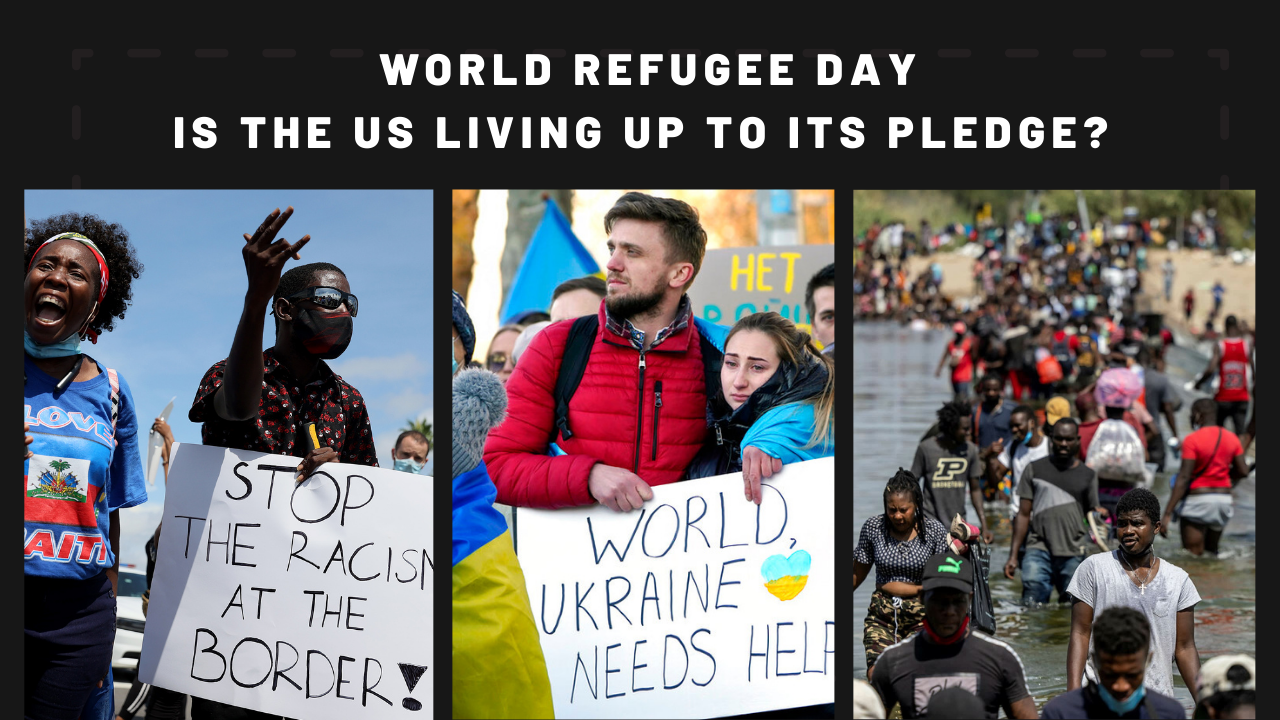Magazine, The Immigrant Experience
Monday [June 20] was World Refugee Day (WRD) – an international day designated by the United Nations to honor refugees around the globe. Each year it celebrates the strength and courage of people who have been forced to flee dangerous homelands and try to rebuild their lives in new countries.
The WRD was first established on 20 June 2001, in recognition of the 50th anniversary of the 1951 Convention Relating to the Status of Refugees. The day is celebrated all over the world on government, organizational, and individual levels to build empathy and understanding for the plight of refugees and to recognize their resilience in rebuilding their lives.
This year, the WRD is being celebrated under the theme, “Whoever. Wherever. Whenever. Everyone has the right to seek safety.”
The US is among the celebrating countries, and this year President Joe Biden issued an official statement stating: “Today, on World Refugee Day, I join people around the world in recognizing the strength, resilience, and humanity of the millions of refugees forced to flee violence, persecution, and war.”
The President expressed a strong commitment “to work with the international community to achieve sustainable, long-term solutions to support refugees – including through resettlement.”
However, the US, the hegemon of the world, that is expected to “do more” seems to be failing in not only accepting an increased number of refugees in the country but also ensuring their “right to seek safety.” Continue reading to learn how.
Humane Treatment
The WRD’s theme demands that refugees should be treated with respect and dignity. They are entitled to safe and dignified treatment like any human being. Among other things, this means keeping families together, protecting people from traffickers, and avoiding arbitrary detention.
The US, however, time and again failed to ensure that people forced to flee their home countries are treated with respect and dignity when they arrive at the US border to claim asylum or refugee status. The maltreatment of Haitian migrants, who were subjected to brutal torture by the US Border Patrol is another one of many examples of inhumane treatment meted out to refugees either in the US or within its territory.
Moreover, the official website of the United States Government still uses the word “alien” for refugees. “Under the Immigration and Nationality Act (INA), a refugee is an alien who, generally, has experienced past persecution or has a well-founded fear of persecution on account of race, religion, nationality, membership in a particular social group, or political opinion,” a page on the website reads.
Not to mention that in April 2021, President Biden ordered to stop using terms such as “alien,” “illegal alien” and “assimilation” when referring to immigrants in the US.
Click on the link to see the use of the “alien” word on the official website of the US government: https://www.state.gov/refugee-admissions/#:~:text=Since%20the%20passage%20of%20the,more%20than%203.1%20million%20refugees
No Discrimination
The WRD’s theme for the current year also pleads that people should not be discriminated against at borders. All applications for refugee status must be given fair consideration, regardless of factors like race, religion, gender, and country of origin.
On the contrary, the US has been found to discriminate against refugees especially Black people, and Muslims while giving special favor to refugees fleeing communist oppression such as the people of Ukraine, and Afghanistan.
The US government – instead of rebuilding its existing refugee program to make it a faster and more effective primary program for bringing the most vulnerable people from different regions of the world to safety – rushed to invent new, crisis-driven welcome programs like “Uniting for Ukraine.” Have you seen the US establishing such a program in the past to facilitate refugees from Africa, Arab, or Asia?
No Pushbacks
Another demand the WRD makes is not forcing refugees to return to a country if their life or freedom would be at risk. This means that countries shouldn’t push anyone back without first evaluating the dangers they would face back home.
The US has so far forcibly expelled 20,000 Haitians to Haiti, where, according to the Human Rights Watch, they face a high risk of violence and have no access to protection or justice.
Safe Access
The UN, on this WRD, has also stipulated that borders should remain open to all people forced to flee. Restricting access and closing borders can make the journey even more dangerous for people seeking safety.
This is another ‘requirement’ the US has failed to fulfill as it forces refugees coming to its southern border to stay in Mexico until getting a humanitarian visa. Thousands of refugees have to stay under insecure and inhuman conditions while awaiting their visas.
Conclusion
The US is a nation of immigrants, and it has welcomed people from all across the globe to live the ‘American Dream.’ However, since the Trump era, and the changing global geo-economic and geo-political dynamics, its immigration policy has become more rigid. The Russian invasion of Ukraine and other emergencies, from Africa to Afghanistan and beyond, have forced 100 million people to flee their home countries.
It may therefore be high time for the US to play its due role. President Biden while shining a ray of hope that the US will not abandon these people who are trying to flee inhuman conditions at home, has also hinted at engaging in diplomatic efforts to address the root causes of displacement and bringing an end to the ongoing conflicts that drive refugees to seek safety across borders in the first place.











